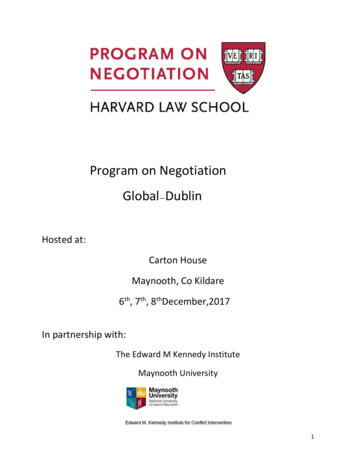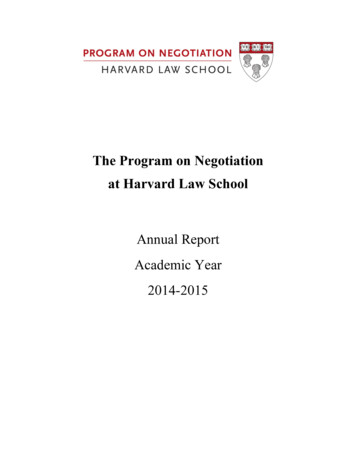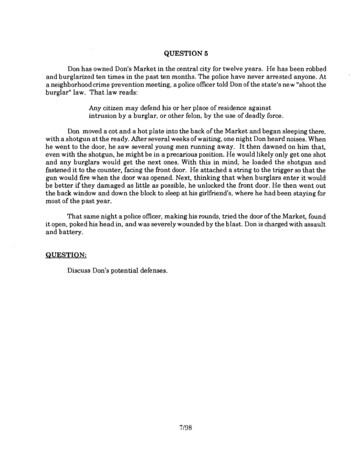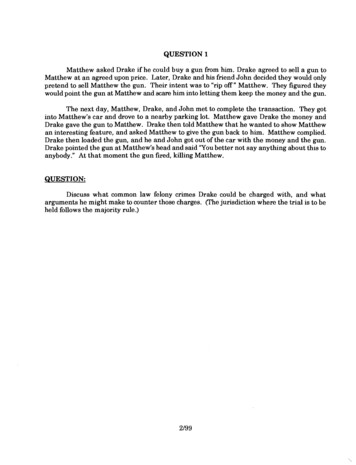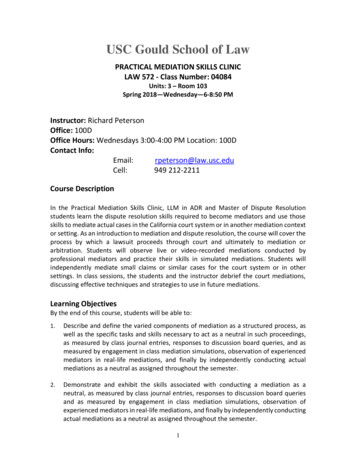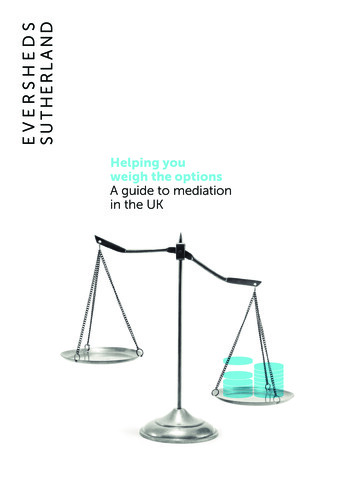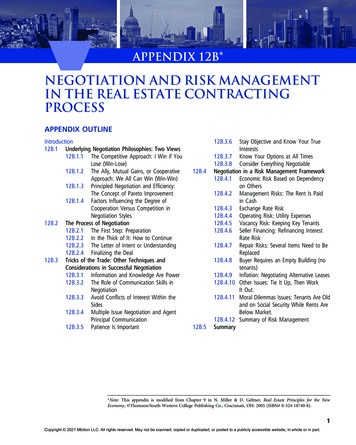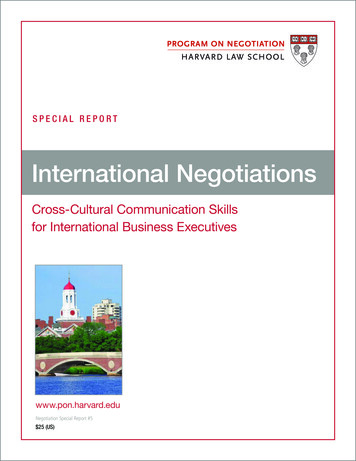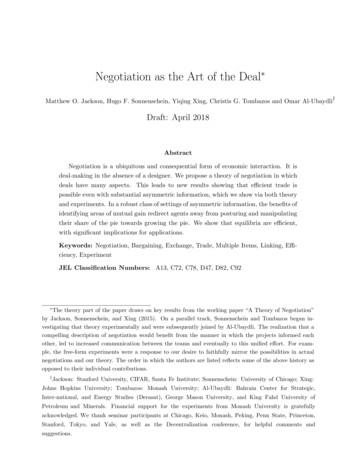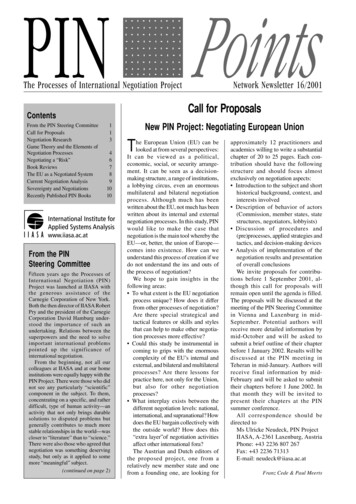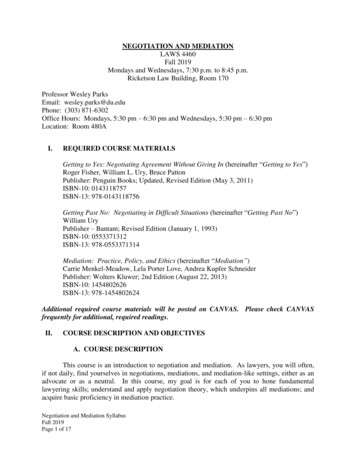
Transcription
NEGOTIATION AND MEDIATIONLAWS 4460Fall 2019Mondays and Wednesdays, 7:30 p.m. to 8:45 p.m.Ricketson Law Building, Room 170Professor Wesley ParksEmail: wesley.parks@du.eduPhone: (303) 871-6302Office Hours: Mondays, 5:30 pm – 6:30 pm and Wednesdays, 5:30 pm – 6:30 pmLocation: Room 480AI.REQUIRED COURSE MATERIALSGetting to Yes: Negotiating Agreement Without Giving In (hereinafter “Getting to Yes”)Roger Fisher, William L. Ury, Bruce PattonPublisher: Penguin Books; Updated, Revised Edition (May 3, 2011)ISBN-10: 0143118757ISBN-13: 978-0143118756Getting Past No: Negotiating in Difficult Situations (hereinafter “Getting Past No”)William UryPublisher – Bantam; Revised Edition (January 1, 1993)ISBN-10: 0553371312ISBN-13: 978-0553371314Mediation: Practice, Policy, and Ethics (hereinafter “Mediation”)Carrie Menkel-Meadow, Lela Porter Love, Andrea Kupfer SchneiderPublisher: Wolters Kluwer; 2nd Edition (August 22, 2013)ISBN-10: 1454802626ISBN-13: 978-1454802624Additional required course materials will be posted on CANVAS. Please check CANVASfrequently for additional, required readings.II.COURSE DESCRIPTION AND OBJECTIVESA. COURSE DESCRIPTIONThis course is an introduction to negotiation and mediation. As lawyers, you will often,if not daily, find yourselves in negotiations, mediations, and mediation-like settings, either as anadvocate or as a neutral. In this course, my goal is for each of you to hone fundamentallawyering skills; understand and apply negotiation theory, which underpins all mediations; andacquire basic proficiency in mediation practice.Negotiation and Mediation SyllabusFall 2019Page 1 of 17
The course begins with a focus on conflict, the causes of conflict, and avenues forresolving conflict. The course builds cumulatively from simple negotiations to those of greatercomplexity—starting with two-party, single-issue negotiations and building toward multi-party,multi-issue mediations that evolve over time and frequently involve party advocates. The courseprogresses step-by-step through the negotiation and mediation processes.B. COURSE OBJECTIVESThis course introduces students to the theory and practice of negotiation and mediation,the most commonly-used forms of legal dispute resolution in the United States and around theworld. The ability to participate successfully in legal negotiations and mediations rests on acombination of five core skills that are addressed in this course:(1)(2)(3)(4)(5)analysis;interpersonal awareness;planning;drafting; andreflection.This course will provide you with a set of conceptual frameworks and practicalexperiences that will enhance your understanding and skill level in all of these areas. You willhave the opportunity to gain the perspectives of clients, advocates, and mediators.(1)AnalysisAnalysis is important because dispute resolution participants cannot develop promisingnegotiation and mediation strategies without acquiring a deep understanding of the theory ofdispute resolution, including an understanding of the context of the situation and the distributionof power (including culture, gender, race, law, economics, politics); the underlying interests ofall of the stakeholders; opportunities for and barriers to creating and claiming value on asustainable basis; personal styles and persuasion techniques; and the range of possible moves andcountermoves—both at and away from the bargaining table. As a mediator, you will analyze theinterests and strategies of the parties and their attorneys and plan your interventions. Throughanalysis of case studies and discussion of articles on dispute resolution, you will learn lessonsthat you can apply to real-world dispute resolution. You will have a chance to practice thisapplication in our in-class role plays.(2)Interpersonal AwarenessInterpersonal Awareness is important because dispute resolution of any kind involvescommunication, relationship development, trust building, and persuasion. Cases and readingsserve to integrate the analytic points into practice, as well as to develop intuition about complex,real-world dispute resolution dynamics. Structured negotiation and mediation role plays are usedto isolate and emphasize specific analytic points and essential skills. Through participation innegotiation and mediation role plays, you will enhance your powers of communication,relationship development, trust building, and persuasion, while experimenting with a variety ofNegotiation and Mediation SyllabusFall 2019Page 2 of 17
negotiation and mediation styles and strategies. From repeated participation in role plays thatinvolve a shifting mix of cooperation and competition, as well as important ethical choices, yourunderstanding of negotiation and mediation practice will develop and improve throughout thesemester.(3)Planning and DraftingPlanning and Drafting are among the most important aspects of successful disputeresolution. However, these skills are often neglected. In order to develop your skills in theseareas, you will be required to draft short planning memos, opening statements, memorandums ofunderstanding, and/or proposed settlement agreements. By taking the time to put your thoughts,strategies and goals in writing, you will increase your ability to discuss your analysis andperceptions. Having drafted a proposed agreement and writing final agreements reflecting theoutcomes of successful negotiations and mediations, you will be prepared to bring closure toyour disputes. This is important for your performance in class, in the final exam, and in yourreal-life opportunities to work with disputes.(4)ReflectionReflection is a skill you will develop, both as to your own performance and that of yourcolleagues. You will be asked to step back and critically appraise what happens in class duringour role plays. You will also be working in groups both in class and out of class that willrequire you to enhance this skill. Giving constructive feedback to and receiving it from othersare skills you will be expected to embrace and develop. Not only will you provide yourassessment, but you will pinpoint and describe what you saw, heard, and felt and the impact oroutcome of what you observed and experienced. You will be expected to offer suggestions forimprovement, as well. You will be expected to be open to and explore feedback that is given toyou from your colleagues and your professor.III.EXPECTATIONS, REQUIREMENTS, GRADINGA. Requirements(1)Attendance and Class Participation (15 points)Active class participation is correlated with academic success. I therefore shall expecteach of you to read thoroughly and be prepared to discuss all class materials. I take attendance,begin class promptly, and expect you to be on time. While I often call on volunteers, I alsoattempt to democratize class discussion by calling on those who do not usually volunteer. Pleasenote that missing class in this course will affect not only our work but also that of yourcolleagues. I, therefore, will excuse class absences only in extremis, and only if I am notified inadvance. Any more than three absences will result in a lowered Attendance and ClassParticipation Grade of two points per absence above three total absences.Throughout the semester you will be required to prepare for negotiations and mediationsbased on various scenarios. These simulations will be performed in either separate groups or asNegotiation and Mediation SyllabusFall 2019Page 3 of 17
stage observations, where one group performs the role play, and the rest of the class observes. Inorder to encourage you to prepare fully for all simulations, I will randomly pick groups for stageobservations. I will also randomly choose the days that the stage observations will occur. Afterevery simulation exercise, there will be a short debriefing period where you will be expected tocall upon the knowledge you have gained from the readings and class discussions to givefeedback to your colleagues.Before any simulations, you will be given confidential instructions for your specific role.Your roles will vary throughout the semester; you may play the role of a participant, client,attorney, or mediator. You are not to share your confidential instructions with others, unless youare assigned confidential instructions as a team. If you are assigned the confidential instructionsas a team, you are not to share your confidential instructions with anyone outside of your team.Because much of our class time will be devoted to both mediation and negotiationsimulations, you will remain responsible for completing all reading assignments, even if there isno lecture on the specific reading assignment. The course has been designed for the readings torelate to the simulations that are planned. You will be expected to use the knowledge you gainfrom the readings during post-simulation debriefings.(2)Group Project (15 points)The Group Project will provide each group of students with the opportunity to research amediation or negotiation topic of their choice, submit a proposal and written materials forpotential acceptance at the CBA-CLE 13th Annual Alternative Dispute Resolution Conference onFriday, November 1, 2019, in Denver, Colorado, and, if accepted, present a poster presentation atthe ADR Conference.You will be assigned to work in groups of up to three members for the Group Project onthe first day of class. Depending on the number of students enrolled in the class, we may need toadjust the numbers in each group.There are three compulsory parts and one optional part to the Group Project. You andyour group members will have to use your negotiating skills to determine how you will dividethe work amongst your group.Part One: The Proposal (3 points)DUE DATE: AUGUST 28, 2019On the first day of class, you will be provided with topic suggestions and detailedinstructions for the Group Project. Your proposal’s topic must be consistent with this year’sADR Conference theme, “Building Healthier Communities Through Effective DisputeResolution.” You must focus your Group Project on any research topic related either tomediation or negotiation. The proposal shall consist of your presentation title, a 50 wordabstract, and a concise statement of no more than 50 words that describes the proposal’s learningobjectives and goals. There should be a minimum of three learning objectives and goals as partof your proposal.Negotiation and Mediation SyllabusFall 2019Page 4 of 17
Students are encouraged to submit proposals to the ADR Conference Committee forreview and acceptance, after I have reviewed and graded them. As the ADR Conference is notbeing held during our regular class time and requires a full day commitment, you are notrequired to have your proposal submitted to the ADR Conference Committee for review.However, you are still required to complete Part One through Part Three of the Group Project.Please indicate in your proposal whether your group would like to submit the proposal to theADR Conference Committee.Part Two: The Written Materials (6 points)DUE DATE: SEPTEMBER 23, 2019The written component will comprise of a 1,250 word paper, double spaced, with propercitations using the Bluebook Law Review format of citation, using either footnotes or endnotes,on your topic. If your proposal is submitted and accepted, your written component will beincluded in the conference materials that all attendees will receive at the ADR Conference. Thewritten component is due on September 25, 2019.Part Three: The Video Presentation (6 points)DUE DATE: OCTOBER 16, 2019Professional conference presenters are often asked to provide a video of prior speakingengagements as part of a request for proposal process. This portion of the Group Project willgive your group an opportunity to prepare such a video. Your entire group must create a 20minute Video Presentation on your chosen topic, due on or before October 9, 2019. Pleaseturn in your videos on a flash drive on or before the due date. Late submissions will not beaccepted. Your Video Presentation will be graded on professional appearance, content ofpresentation, oral execution, and whether the learning objectives from your proposal are met.On the same flash drive as your recorded presentation, after the conclusion of yourpresentation, include a short discussion of no more than five minutes regarding how you dividedthe work between the members of your group, how your group worked well together, and areaswhere your group could improve.I will provide groups who are presenting at the ADR Conference with feedback on thevideos before you present at the ADR Conference, if you choose to complete Part Four of theGroup Project.Part Four: The ADR Conference Poster Presentation (Optional)DATE: 11/1/19If you indicated that you want your proposal submitted to the ADR ConferenceCommittee for review, and the proposal is accepted, your group will be expected to present yourposter at the ADR Conference. Presenting at the ADR Conference will not be a factor inassessing your grade on the Group Project. However, although Part Four is optional, those whopresent at the ADR Conference will have the opportunity to network with a community of ADRprofessionals and attend conference sessions. I encourage all students to present their work atNegotiation and Mediation SyllabusFall 2019Page 5 of 17
the ADR Conference, if possible. If you present at the ADR Conference, your tuition to theADR Conference will be waived, and you will be provided with breakfast and lunch.The ADR Conference Poster Presentation session will provide conference attendees witha “micro-learning” opportunity, giving bite-sized content, and the ability for attendees to learnoutside of the longer plenary and breakout sessions. The ADR Conference will last fromapproximately 7:30 am to 5:30 pm on Friday, November 1, 2019. You should plan on attendingthe ADR Conference for its entirety if you submit a proposal to the ADR Committee for review.However, you will only be obligated to present your poster for approximately one (1) hourthroughout the day.If accepted to present at the conference, at least one presenter shall stand at or near bytheir poster during registration and networking breaks to discuss your Group Project withconference attendees. This will allow you the opportunity to talk with participants about yourresearch and answer questions regarding your work. You will be able to attend all otherscheduled plenary and breakout sessions.(3)Short Drafting Assignments (15 points)You will complete three individual Short Drafting Assignments, separate from the GroupProject. The short drafting assignments are indicated by the phrase “to turn in” in § C, infra.The Short Drafting Assignments will be worth a maximum of five points each. The assignmentswill focus on negotiation preparation, ethics, and settlement documents. You will be required toturn in your Short Drafting Assignments before the start of class on the day the assignment isdue. Late submissions of the Short Drafting Assignment will be given zero points. The duedates for the Short Drafting Assignments are as follows:(a) ASSIGNMENT 1 DUE DATE: 9/4/19(b) ASSIGNMENT 2 DUE DATE: 10/9/19(c) ASSIGNMENT 3 DUE DATE: 11/20/19(4)Mediation Simulation (15 points)You and another student will perform a graded Mediation Simulation during the latterpart of the semester, on a date to be determined. The Mediation Simulation will be a 60 minuteexercise where you will be paired in teams of two playing either two co-mediators, twoattorneys, or an attorney and client. You will receive a confidential fact pattern based on yourspecific role. The confidential roles must be kept confidential and cannot be shared among otherteams. Any sharing of confidential roles shall be deemed a violation of the Honor Code andsubject you to disciplinary action.Due to the amount of material we must cover during class, the graded MediationSimulation exercise must be scheduled outside of class. I will provide you with a sign-up sheetmid-semester, and the simulations will occur in the evenings or on weekends during the last threeweeks of class or during reading week.(5)Final Exam (40 points)Negotiation and Mediation SyllabusFall 2019Page 6 of 17
The final exam will cover all the material covered in class and all class readingassignments, whether or not covered in class. I advise you to stay current with the readingsthroughout the semester, and outline the main points in the readings in anticipation of the finalexam. The final exam will be an open book exam that must be completed during the scheduledexam period. You will be allowed to bring the required books, readings, and written notes intothe examination, but you will not have access to your computer during the exam. The exam willconsist of 25 multiple choice questions (one point each), 10 short answer questions (one pointeach), and a short essay (five points), for a total of 40 possible points. The exam shall bescheduled during the final exam period. I will update you on the exact date and time of the finalexamination when I receive this information from the registrar.B. Grading, Mandatory Curve, Anonymity, and Accommodations(1)GradingI shall assign the following points for each class requirement detailed supra:Attendance and In-class ParticipationGroup ProjectShort Drafting AssignmentsMediation SimulationFinal ExaminationTOTAL:15 points15 points*15 points15 points*40 points100 points*Please note the Group Project and Mediation Simulation will be assigned points as ateam.The following grading scale shall be used:Point 965-660-64(2) Mandatory CurveNegotiation and Mediation SyllabusFall 2019Page 7 of 17GradeAAB BBC CCDDF
The final grades for this course must substantially conform to the mandatory curve with amedian of 3.0 and a mean between 2.85 and 3.15 grade point average. As such, final grades maybe adjusted to conform to the law school’s mandatory curve/grade normalization policy.(3) Anonymity in GradingYour final examination and your ethics essay will be graded anonymously pursuant to thelaw school’s anonymous grading policy. Due to the nature of the Group Project, the other ShortDrafting Assignments (not including the ethics essay), and the Mediation Simulation, theseassessments will not be graded anonymously.(4) AccommodationsIf you have a disability/medical issue protected under the Americans with DisabilitiesAct (“ADA”) and Section 504 of the Rehabilitation Act and need to request accommodations,please visit the Disability Services Program website at www.du.edu/disability/dsp. You may alsocall (303) 871-2372, or visit in person on the 4th floor of Ruffato Hall, 1999 E. Evans ces/faculty-staff/index.html.C. TOPICS AND ASSIGNMENTSThe following chart details the topic for the day and the assignment that must becomplete prior to class, unless otherwise indicated as an “in class” assignment. The topics andassignments contained herein are subject to change. You will be notified of amendments, andthe amended topics and assignments will be posted on CANVAS.ClassClass 1: August 19Topics and AssignmentsIntroduction to the Class, Class Overview, and Understandingyour Personal Conflict StyleAssignment: Read Mediation, Chapter 1, pp. 3-33 Read Style Matters : The Kraybill Conflict Style Inventory,pp.1-23, and take the conflict style assessment, on CANVAS Prepare to be interviewed by a classmate, who will introduceyou to the class. You will be asked: (1) What is your name andyear in law school; (2) Where is your hometown; (3) Why are youtaking this class; and (4) What is your Kraybill style of respondingto conflict? In class, Group Project partner assignments In class, obtain instruction sheet on proposals for GroupProjectNegotiation and Mediation SyllabusFall 2019Page 8 of 17
In class, obtain Distributive Bargaining Negotiationconfidential information sheetClass 2: August 21Overview of Negotiation Processes; Stages of NegotiationAssignment: Read Mediation, Chapter 2, pp. 35-52 Read Menkel-Meadow et al., Negotiation, Chapter 1, pp. 31-36on CANVAS Prepare for Distributive Bargaining Negotiation Simulation;Answer the following questions before class:1)2)3)4)What are your goals?What is your anchor point? Why?What is your reservation point? Why?Who should make the first offer? Why? In class, Distributive Bargaining Negotiation SimulationClass 3: August 26Negotiator EffectivenessAssignment: Read Mediation, Chapter 2, pp. 57-69 Read Hal Abramson, Fashioning an Effective NegotiationStyle: Choosing Between Good Practices, Tactics, and Tricks, 23Harv. Negot. L. Rev., pp. 319-344 (2018) on CANVAS In class, Prisoner’s Dilemma exerciseClass 4: August 28Interest-based Negotiation Styles/StrategiesAssignment: Watch video: Negotiation Expert: Lessons from my Horse,Margaret Neale located athttps://www.youtube.com/watch?v KTTtn0i ZyA Read Getting to Yes, Chapters 1-5, pp. 3-95 GROUP PROJECT PROPOSAL DUE In class, Survival in Space exerciseNegotiation and Mediation SyllabusFall 2019Page 9 of 17
In class, obtain confidential instructions for Opera Singer’sContract SimulationLABOR DAYNO CLASSInterest-based Negotiation Styles/Strategies ContinuedAssignment: Watch video: Getting to Yes in the Real World, William Urylocated at https://www.youtube.com/watch?v lYdk1NK9-r0 Read Getting to Yes, Chapters 6-8 and Conclusion, pp. 96-194Class 5: September 4Techniques to Avoid ImpasseAssignment: Read Getting Past No, Part I, pp. 3-28 Read Getting Past No, Part II, pp. 29-75 Read Katie Shonk, A Negotiation Preparation Checklist,Harvard Program on Negotiation (Aug. 8, 2019), on CANVAS Prepare for Opera Singer’s Contract Simulation (see ShortDrafting Assignment below) SHORT DRAFTING ASSIGNMENT 1 DUE: Draft anegotiation memorandum of no more than 500 words based on theSinger’s Contract Simulation confidential instructions to turn in.Your memorandum must answer the following questions:1)2)3)4)What issues should be addressed during the negotiation?What is your BATNA? Why?What are each parties’ underlying interests?What objective criteria will you use during thenegotiation?5) What are possible good outcomes of the negotiation?6) What are possible impediments to settlement? In class, Opera Singer’s Contract Simulation and debriefingClass 6: September 9Techniques to Avoid Impasse ContinuedAssignment: Read Getting Past No, Part II, pp. 76-156 Read Getting Past No, Part III, pp. 157-181Negotiation and Mediation SyllabusFall 2019Page 10 of 17
In class, obtain confidential instructions for Rock BandNegotiationClass 7: September 11Preparing for NegotiationAssignment: Read Menkel-Meadow et al., Negotiation, Chapter 6, pp. 203231 on CANVAS Prepare for Rock Band Negotiation using an interest-basedbargaining model In class, Rock Band Negotiation and debriefingClass 8: September 16Relating to your Counterpart: Information Exchange, Trust,Reputation, and PowerAssignment: Read Menkel-Meadow et al., Negotiation, Chapter 7, pp. 233246, 254-273 on CANVAS In class, obtain confidential instructions for Student v.University SimulationClass 9: September 18Working with your Counterpart: Understanding and EmotionsAssignment: Read Menkel-Meadow et al., Negotiation, Chapter 8, pp. 275314 on CANVAS Read Active Listening Checklist, on CANVAS Prepare for Student v. University Simulation In class, Student v. University Simulation and debriefingClass 10: September 23Negotiation and Mediation EthicsAssignment: Read Mediation, Chapter 9, pp. 319-354 Read Mediation, Model Standards of Conduct for Mediators,Appendix B, pp. 557-562Negotiation and Mediation SyllabusFall 2019Page 11 of 17
In class, watch INTA/CPR International Dispute Video, locatedat: https://www.youtube.com/watch?v xTbj-eHwXw&feature youtu.be. GROUP PROJECT: WRITTEN MATERIALS DUE Obtain confidential instructions for Business Sale SimulationClass 11: September 25Introduction to Mediation, Agreements to MediateAssignment: Read Mediation, Chapter 3, pp. 85-107 Read sample Agreements to Mediate and Highlights ofAgreement to Mediate on CANVAS In class, obtain prompt for Short Drafting Assignment 2:Ethics Essay In class, Business Sale Simulation and debriefClass 12: September 30Mediator Traits, Tasks, and Qualifications; Stages of Mediation,and the Using the CaucusAssignment: Read Mediation, Chapter 6, pp. 203-237 Read Mediation Process Outline on CANVAS Watch Tenant-Landlord Mediation located athttps://www.youtube.com/watch?v j6JEpg10pbw In class, Mediation Opening Statement exercise In class, obtain confidential instructions for Two-party ProbateMediation SimulationClass 13: October 2Transformative, Facilitative, and Evaluative ModesAssignment: Read Mediation, Chapter 3, pp. 107-119 Read Mediation, Chapter 6, pp. 239-241 Prepare for Two-party Mediation SimulationNegotiation and Mediation SyllabusFall 2019Page 12 of 17
In class, Two-party Probate Mediation Simulation and debriefClass 14: October 7Mediation AdvocacyAssignment: Read Douglas N. Frankel & James H. Stark, ImprovingLawyers’ Judgment: Is Mediation Training De-Biasing? 21Harv. Negot. L. Rev. 1 (2015), pp. 1-4 and pp. 8-17 on CANVAS Read Amsterdam, et al., Lawyering, Chapter 11, pp. 274-298on CANVAS Read Jacqueline Nolan-Haley, Mediation: The “NewArbitration,” 17 Harv. Negot. L. Rev. 61 (2012), pp. 61-68 andpp. 73-83 on CANVAS Roselle L. Wissler, Representation in Mediation: What WeKnow from Empirical Research, 37 Fordham Urb. L.J. 419(2010), pp. 431-435 on CANVASClass 15: October 9Client CounselingAssignment: Read Mediation, Chapter 13, pp. 473-496 In class, guest lecturer Amy Roepke In class, obtain confidential instructions for Attorney-ClientMediation SHORT DRAFTING ASSIGNMENT 2 DUE: Draft aresponse to the Ethics Essay prompt of not more than 750 wordsto turn in anonymouslyClass 16: October 14Mediation Advocacy: Preparation, Mediation Brief, and theProcessAssignment: Read Mediation, Chapter 5, pp. 184-199 Read Brian Farkas & Donna E. Navot, First Impressions:Drafting Effective Mediation Statements, 22 Lewis & Clark L.Rev. 158 (2018), pp. 10-19 on CANVASNegotiation and Mediation SyllabusFall 2019Page 13 of 17
Read pre-mediation brief checklist on CANVASClass 17: October 16 In class, Attorney-Client Mediation Simulation and DebriefThe Use of Apology in Negotiation and MediationAssignment: Read Menkel-Meadow et al., Negotiation, Chapter 7, pp. 247254 on CANVAS Read Mediation, Chapter 5, pp. 199-202 Read Jennifer Robbennolt, Apology – Help or Hindrance? 10Disp. Resol. Mag. 33-34 (2004). Read Zaina Afrassiab, Why Mediation & Sorry Make Sense:Apology Statutes as a Catalyst for Change in MedicalMalpractice, 2019 J. Disp. Resol. 197-212 (2019), on CANVAS. Read § 13-25-135, C.R.S. GROUP PROJECT: VIDEO PRESENTATIONS DUEClass 18: October 21The Inherent Irony of Mediation LitigationAssignment: Read James R. Coben and Peter N. Thompson, DisputingIrony: A Systematic Look at Litigation about Mediation, 11 Harv.Negot. L. Rev. 77-99 (2006) on CANVAS In class, guest lecturer Tessa DeVaultClass 19: October 23Implicit Bias in Negotiation and MediationAssignment: Read Serena Patel, Cultural Competency Training: PreparingLaw Students for Practice in Our Multicultural World, 62 UCLAL. Rev. Disc. 140-155 (2014), on CANVAS Read David A Binder et al., Lawyers as Counselors: A ClientCentered Approach, Chp. 1, pp. 1-10, on CANVAS Read Mediation, Chapter 7, pp. 264-288 In class, guest lecturer Amy RoepkeNegotiation and Mediation SyllabusFall 2019Page 14 of 17
Class 20: October 28Consensus Building and FacilitationAssignment: Read Mediation, Chapter 11, pp. 395-408 Read Mediation, Chapter 11, pp. 409- 424 In class, obtain confidential instructions for MultipartyMediation SimulationClass 21: October 30Multiparty MediationAssignment: Read Mediation, Chapter 11, pp. 425-448 Prepare for Multiparty Mediation Simulation In class, Multiparty Mediation Simulation and debrief In class, obtain settlement agreement Short DraftingAssignmentFriday, November 1,2019Class 22: November 4CBA-CLE 13th Annual ADR ConferencePoster Presentations (Optional)Negotiated RulemakingAssignment: Read Hannah J. Wiseman, Negotiated Rulemaking and NewRisks: A Rail Safety Case Study, 7 Wake Forest J. L. & Pol’y,207-226 (2017), on CANVAS In class, obtain confidential instructions for Multi-stakeholderNegotiated Rulemaking SimulationClass 23: November 6Negotiated RulemakingAssignment: Prepare for Multi-stakeholder Negotiated RulemakingSimulation continued In class, Multi-stakeholder Negotiated Rulemaking SimulationClass 24: November 11Negotiated RulemakingAssignment:Negotiation and Mediation SyllabusFall 2019Page 15 of 17
In class, Multi-stakeholder Negotiated Rulemaking Simulationcontinued and debrief In class, obtain Short Drafting Assignment 3 instructionsClass 25: November 13International Negotiation and MediationAssignment: Read Mediation, Chapter 11, pp. 442-472Class 26: November 18The Relationship Between Law and MediationAssignment: Read Mediation, Chapter 8, pp. 289-295 Read Mediation, Uniform Mediation Act, Appendix A, pp.551-555 Read the Colorado Dispute Resolution Act, § 13-22-301, etseq. on CANVAS Read Pearson v. Dist. Court, 924 P.2d 512 (Colo. 1996), onCANVAS Read Yaekle v. Andrews, 195 P.3d 1101 (Colo. 2008), onCANVAS Read GLN Compliance Grp., Inc. v. Aviation Manual Sols.,LLC, 203 P.3d 595 (Colo. App. 2008), on CANVASClass 27: November 20Thinking Critically about Mediation and the Problem with the“Harmony Ideology”Assignment: Read Laura Nader, From Legal Process to Mind Processing,30 Fam. & Concil. Cts. Rev. 468-473 (1992), on CANVAS Read Mediation, Chapter 14, pp. 507-538 SHORT DRAFTING ASSIGNMENT 3 DUE: ReviewMediation, Chapter 6, pp. 237-238; Draft Memorandum ofUnderstanding of no more than 500 words to turn inClass 28: November 25Course ReviewNegotiation and Mediation Sy
Getting to Yes: Negotiating Agreement Without Giving In (hereinafter "Getting to Yes") Roger Fisher, William L. Ury, Bruce Patton Publisher: Penguin Books; Updated, Revised Edition (May 3, 2011) ISBN-10: 0143118757 ISBN-13: 978-0143118756 Getting Past No: Negotiating in Difficult Situations (hereinafter "Getting Past No") William Ury
